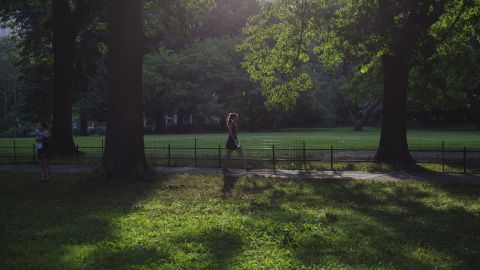Forest bathing could be the key to feeling better – and you can even do it at work

You are walking slowly through a forest with birds gently chirping around you. The wind glides through the trees, and you bend down to scoop up some earth, noticing the aroma.
Relaxed yet?
That sensory experience is an example of a forest bath, a practice that has been shown in about 20 studies to improve mental and physical health, and it has become a prescribed treatment for stress-related conditions in Japan, according to Kirsten McEwan, an associate professor, and research psychologist at the University of Derby in the United Kingdom.
Spending any time in nature is a great way to improve your mental health, and the ideal amount of time is about 120 minutes a week, said health and environmental psychologist Mathew White, a senior scientist at the University of Vienna. That may sound like a lot, but you don’t have to do it all at once.
“Just having those micro-moments of life in nature, whether it is just 5 or 10 minutes a day building up to that 120 minutes, it all has massive benefit,” McEwan said.
Forest bathing can add even more to your well-being – and though it may sound a little inaccessible, experts say everyone can incorporate it into their lives.
How to do it
In fact, forest bathing doesn’t have to take place in a forest.
“Forest bathing is essentially a slow, mindful walk in nature where you pay really close attention to your surroundings, using all of your senses,” McEwan said. “It’s just to kind of switch your brain off and give yourself a little bit of a rest from ruminating about your to-do list.”

But you don’t have to walk all that much to reap the benefits if you are appreciating your surroundings. And consider this: Nature isn’t just waiting for you on your next beach or camping trip.
“Nature is oftentimes under our nose if we just take the time to be intentional about connecting with it,” said Chloe Carmichael, a New York therapist. Even those who live in areas surrounded by natural beauty can start to tune it out, so intentional focus is key, she said.
Whether you live in a bustling city or an expansive rural area, Carmichael and McEwan said, everyone can benefit from time in nature – and the best way to build time outdoors into your routine is to incorporate it into what you already do.
On your commute
Walking is great for a forest bath, even if it’s on your way to work or school.
Maybe you leave a little earlier and go more slowly, taking a route with more greenery, McEwan said. Perhaps you pay closer attention to the flowers springing through the cracks in the cement or the trees lining the street, she added.
“It’s like nature reclaiming the city,” McEwan said.
During a meal
If you consider yourself a home chef and regularly cook dinner for yourself and loved ones, maybe it’s time to grow herbs in your kitchen, said Carmichael, who is also author of “Nervous Energy: Harness the Power of Your Anxiety.”
It’s an easy way to bring something natural and fragrant into your routine without requiring too much work, she added.
And once dinner is ready, consider moving the meal outside in mild weather.
If you can put some focus into the environment and observe the world going on around you, having a meal in your yard or on a patio is a great way to get your minutes in nature, McEwan said.
In your office
Getting your forest bath in the office can be good for both you and your work, Carmichael said.
That could mean going on a weekly lunch walk with a work friend, or taking a break to look out the window or even bringing a plant into your office, she added.
If you have meetings in small groups, you could suggest taking the meeting while walking or sitting outside, McEwan said.
“We are more relaxed and creative when we are outside anyway,” she said.
When you can’t get moving
Mobility isn’t always accessible to everyone, and while moving outside is optimal, there are other ways to get the benefits, McEwan said.
Videos online can take you through photos and videos of the natural world, with narration guiding your attention, she said.
An essential oil diffuser can also help if loaded with pine or evergreen scents, since much of the benefit of forest bathing comes from breathing in the organic compounds trees emit, McEwan said.
Above all, be comfortable
However you choose to forest bathe and get your time in nature, the most important thing is to find something that works for you, McEwan said.
Find a guiding audio that makes you feel good and isn’t too prescriptive in how you interact with your natural world, she suggested. And if hugging a tree or smelling the dirt feels unnatural and cringey to you, find a different way.
“To get the maximum benefits of spending time in nature, you have to be comfortable,” she said.


